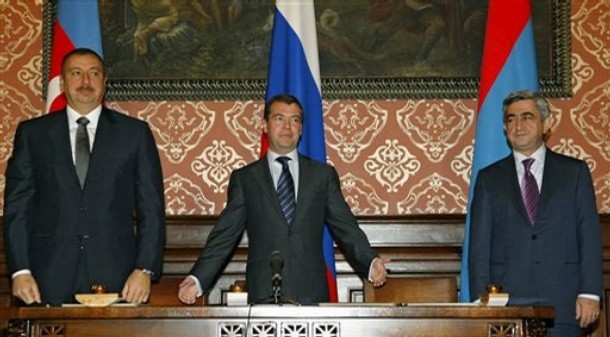
Moscow Pushes New Armenian-Azerbaijani Peace Deal
Publication: Eurasia Daily Monitor Volume: 7 Issue: 203
By:

Russian President, Dmitry Medvedev, has expressed “moderate” optimism about a near-term resolution of the Karabakh conflict after hosting yet another meeting of his Armenian and Azerbaijani counterparts. The talks held in the southern Russian city of Astrakhan on October 27 underscored Moscow’s key role in the Armenian-Azerbaijani negotiating process, which appears to have become more pronounced in recent months.
In a joint statement with Medvedev signed after the meeting, the Presidents of Armenia and Azerbaijan, Serzh Sargsyan and Ilham Aliyev respectively, reaffirmed their stated commitment to a “political-diplomatic” settlement and pledged to reinforce the fragile ceasefire regime in the conflict zone. Sargsyan and Aliyev said that for that purpose they agreed to expedite, “without delay,” an exchange of prisoners of war and the bodies of soldiers killed in recent skirmishes (www.kremlin.ru, October 28).
Medvedev described the statement as “very important” as he spoke to journalists afterwards. More importantly, Medvedev expressed hope that the conflicting parties will soon bridge their differences on the so-called “basic principles” of Karabakh peace put forward by the Russian, US and French mediators acting under the aegis of the Organization for Security and Cooperation in Europe’s (OSCE) Minsk Group. Medvedev said they could do that in time for the OSCE’s December 1-2 summit in Kazakhstan. “I think that a result can be achieved. That gives me certain, moderate optimism,” Medvedev added in remarks broadcast by Russian television. With both the mediators and the parties still keeping virtually all details of the negotiations confidential, it is difficult to determine how justified this declared optimism may prove.
The Kremlin already stated after the previous Armenian-Azerbaijani summit, hosted by the Russian leader in St. Petersburg on June 18 that Sargsyan and Aliyev narrowed their differences on “several contentious provisions of the text of the basic principles of the settlement.” Medvedev reportedly presented them with new peace proposals that were essentially accepted by Yerevan and rejected by Baku. The Azeri foreign ministry said the proposals are unacceptable because they would change “the whole philosophy of the negotiating process” (www.day.az, July 22). The St. Petersburg meeting was also followed by an upsurge in deadly ceasefire violations along the main Armenian-Azerbaijani “line of contact” around Karabakh.
In a late August interview with Azeri news agencies, Russian Foreign Minister, Sergei Lavrov, said there are only “two or three issues” that have not yet been agreed upon by both parties. Lavrov suggested that they sign an interim framework agreement that would leave out these sticking points and formalize progress made in the Armenian-Azerbaijani peace talks so far. Whether this is what Medvedev proposed in St. Petersburg or if this is the type of accord he hopes will be reached at the OSCE summit is unclear.
Officials in Yerevan and Baku have continued to sound less than optimistic about the chances of a long-awaited breakthrough even after the Astrakhan talks, with each side saying that the onus is on the other to take major steps towards peace. The spokesman for Sargsyan’s Republican Party of Armenia, Eduard Sharmazanov, said an agreement on Karabakh can be hammered out in the coming weeks only if Azerbaijan becomes “really constructive” in the talks (www.armenialiberty.org, October 28). But according to Aliyev’s chief foreign policy aide, Novruz Mammadov, it is the Armenians who should abandon their “destructive position” and “think about the future of their country” (Zerkalo, October 30).
Indeed, both parties continue to offer opposite interpretations of the framework peace deal proposed by the mediators. Yerevan insists that it paves the way for an eventual international recognition of Karabakh’s secession for Azerbaijan. Aliyev and other Azeri leaders say, however, that the basic principles uphold Baku’s sovereignty over the disputed territory. US Secretary of State, Hillary Clinton, gave no indication that a Karabakh settlement is on the horizon when she visited the two South Caucasus states in July. US diplomats have privately said that no agreement is likely to be reached this year.
Prospects for such a settlement, which would have profound security implications for the entire region, are further dimmed by an intensifying war of words between Armenia and Azerbaijan. In particular, Sargsyan spoke on October 18 of growing “anti-Armenian fascism” in Azerbaijan promoted “on the highest level.” He pointed to Aliyev’s repeated claims that modern-day Armenia is located on “historical Azerbaijani lands” (Armenian Public Television, October 18).
Yerevan also reacted furiously to the October 4 suspicious death in Azeri custody of a young Armenian man captured by Azeri troops in September. Baku claims that Manvel Saribekian committed suicide in his prison cell. They also suggest that he was sent to Azerbaijan by the Armenian security forces to carry out acts of sabotage. The Armenian government and Saribekian’s family have strongly denied this, saying that the 20-year-old resident of an Armenian border village accidentally strayed into Azeri territory while grazing cattle.
Regardless of its outcome, the fresh Russian push for Karabakh peace is a vivid indication of Russia’s increased geopolitical role in the region and the Armenian-Azerbaijani conflict zone in particular. Moscow recently extended and upgraded its military presence in Armenia through a new defense pact signed with Yerevan. It is also clearly gaining more leverage against Baku with reported plans to supply the Azeri military with S-300 air-defense systems and other hardware. The Astrakhan talks were the seventh Aliyev-Sargsyan encounter arranged by Medvedev in less than three years.
Washington and Paris seem willing to let Moscow take center stage in the Karabakh peace process. They both were quick to welcome the statement issued in Astrakhan and praise Medvedev’s personal involvement. “This joint statement represents a positive development in the ongoing OSCE Minsk Group process to reach a peaceful resolution to the conflict of Karabakh and we look forward to seeing its implementation as soon as possible,” US State Department Spokesman, Philip Crowley, said on October 28 (www.state.gov).




